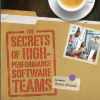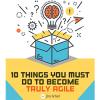 |
Mutual Trust: A Foundation for Self-Organized High Performing Agile Teams One of the major contributors to an agile project's success or failure are the people. When it comes to people and self-organized high-performing teams, mutual trust is the foundational and one of the most critical factors. This article focuses on mutual trust in the context of agile software development, the 7 principles, and related steps on how this can be achieved towards building self-organizing and high-performing teams.
|
|
 |
The Veracity about Velocity Novice project management, measurement analysts, and even leadership may attempt to use velocity (an indicator of workload completed) comparisons to drive innovation and improvement across teams. In turn, teams are then motivated to inflate story points and velocity while losing perspective of their true purpose: value delivery.
|
|
 |
Is Iterative Development Still Relevant? Iterative development is a forerunner of Agile and can be seen as a hybrid retaining some aspects of Waterfall. This article looks at whether it is still of value to project delivery and in what circumstances it could be useful.
|
|
 |
Finding the Sweet Spot Between Order and Chaos Agile gives us complete freedom and ownership over the development process, but without a healthy measure of self-organization and management, all of that autonomy will not amount to much. Let’s take a look at the chaos and order aspect of agile and how you can embrace both.
|
|
 |
The Secrets of High-Performance Software Teams Of all issues that impact getting quality products out on time, the team should never focus on simply managing costs. To minimize the risk of perpetual product delivery delays, define what “done” really means.
|
|
 |
You Get What You Tolerate We’ve all worked with a talented developer who can be a frustrating challenge to manage. First-time managers may unknowingly encourage bad behavior. There are several innovative ways to resolve the situation.
|
|
 |
Achieving Continuous Improvement and Innovation in Software There is tremendous pressure on software development teams to deliver software faster, better, and cheaper. Quality engineering with a focus on innovation is the answer
|
|
 |
10 Things You Must Do to Become Truly Agile Agile is not a state of doing; it’s a state of being. Adopting business models on value and learning how to make teams autonomous are both necessary steps to reap the benefit of agility.
|
|
 |
The United State of Women Summit: An Interview with Tania Katan
Video
In this interview, Axosoft evangelist Tania Katan, who is also the creative instigator of the international viral campaign #itwasneveradress, reports on being invited to the White House’s United State of Women Summit. She talks about agile project management, activism, and Michelle Obama and Oprah.
|
|
 |
How Agile Helped a Business Analyst Discover Her True Value: An Interview with Diane Zajac-Woodie
Video
Diane Zajac-Woodie sat down to discuss her upcoming presentation at Agile Development and Better Software Conference West 2014, why the business analyst role doesn't get the attention it deserves, how the BA role can make a difference on agile teams, and her alter ego as the Agile Squirrel.
|
|
 |
The Essential Product Owner—Championing Successful Products: An Interview with Ellen Gottesdiener
Video
In this interview, Ellen Gottesdiener talks about her presentation at Agile Development Conference and Better Software Conference West 2014, the importance of having context for requirements, good ways to set value considerations for requirements, and the common mistakes of product owners.
|
|
 |
Agile Resiliency: An Interview with Jeff Dalton
Video
Jeff Dalton is an author, a consultant with more than twenty-five years of software process improvement experience, and president of Broadsword, a management-consulting firm. In this interview, Jeff talks about agile resiliency and large organizations making the agile transition.
|
|
 |
Tear It Down to Build It Up: Using Agile in Construction Project Management
Slideshow
Operating on the philosophy that one must thoroughly know the rules before one can break them, a global company developed its own delivery model that is still as true to the agile mindset as is possible. Join Arjay Hinek in this lively session as he deconstructs his company's experiment in melding agile with construction project management to create a hybrid delivery model. At first, the teams were struggling with clear ownership, timely communication, and clear follow-through on work in progress. From modifying the user story mapping model in order to improve project initiation to dissecting and rewriting the values and principles of the Agile Manifesto, Arjay stretched agile practices to the limit to help his teams strive and grow through iterative and incremental delivery. Arjay will share the struggles, failures, and successes of this innovative experiment.
|
Arjay Hinek
|
 |
Test Management in Agile—What Happened to All My Testers?
Slideshow
Substantial confusion exists about the roles and responsibilities of test management when using an agile software development process. Agile seeks to streamline project management and leadership under the role of a ScrumMaster, but what does this mean for test managers? How do they stay...
|
Jeffery Payne
|
 |
Testing at 43,000 Feet: Reporting Risk That Matters
Slideshow
Testing dashboards can give stakeholders the false impression that projects are under control. But are they really? As a tester, you can see a counter indicating a high percentage of passing tests but know that you may still have critical failures in the product. Alexandre Bauduin will...
|
Alexandre Bauduin
|
 |
Behavior-Driven Development: Real-World Mind Reading
Slideshow
Imagine this scenario: Business users are excited to finally get their hands on an implementation delivery that is on schedule, (mostly) on budget, and passed rigorous testing with flying colors. Unfortunately, when working with the new app or feature, the users realize that the way they described their needs didn’t translate into what they actually needed. Sound familiar? While she may not be able to offer telekinetic mind-reading tools, Kim Tatum is convinced that leveraging a behavior-driven development (BDD) approach helps bridge the gap between domain experts and technical teams. Join Kim to discuss how natural, human-readable language ultimately creates shared accountability and reduces misunderstandings. Review how this framework is implemented on a variety of delivery projects and walk through an implementation approach and leading practices.
|
Kim Tatum
|
Visit Our Other Communities
AgileConnection is a TechWell community.
Through conferences, training, consulting, and online resources, TechWell helps you develop and deliver great software every day.

